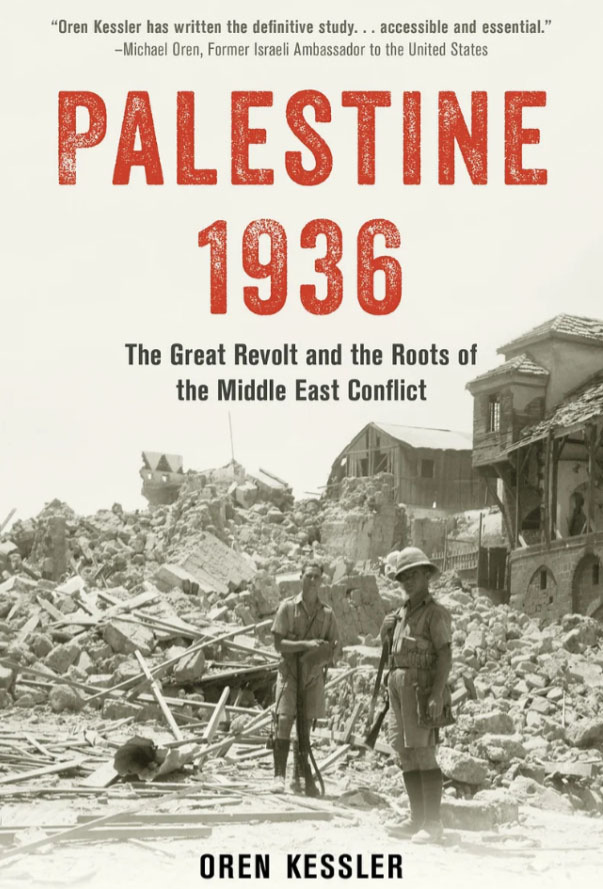by Oren Kessler
Lanham, Md.: Rowman & Littlefield, 2023. 317 pp. $26.95.
Reviewed by Daniel Pipes
Middle East Forum
Middle East Quarterly
Fall 2023

Kessler, a think tanker and journalist writing his first book, has taken up a topic that ought to be well studied but, as he notes, is not. His impressive immersion in the sources and his lively writing bring the "Great Arab Revolt" of 1936-39 to life and show its continued significance. It was then, he argues, and not in 1948, that Palestine's Jews consolidated the demographic, geographic, and political basis of their state-to-be. And it was then that portentous words like "partition" and "Jewish state" first appeared on the international diplomatic agenda.
His history details growing Palestinian-Zionist disputes, tensions, and violence that build and build until they reach a climax with the London conference of early 1939. At that point, awareness of a looming conflict with Germany forced the pro-Zionist Malcolm MacDonald, British secretary of state for the colonies, effectively to walk back the Balfour Declaration's promises of a "national home for the Jewish people." With great fairness, Kessler dismisses as unpersuasive David Ben-Gurion's claim that, if not for that reversal, the six million Jews in Europe would not have been exterminated. Most of them would have been alive in Palestine.
But he does endorse Golda Meir's claim that "hundreds of thousands of Jews—perhaps many more" could have been saved.
At the same time, Kessler sympathizes with MacDonald's quandary. The United Kingdom could not afford the general enmity of Arabs and Muslims that Jewish immigration to Palestine would have occasioned:
If Britain lost and Hitler won, there would be no National Home. The Jews would be killed or expelled from Palestine, just as they had been 2,000 years earlier.
It is hard to argue with this analysis.
Returning to the Palestinian-Israeli conflict, Kessler convincingly shows that the 1936-39 revolt strengthened the Zionists and weakened the Palestinians, to the point that the latter had effectively already lost the war [of 1948-49], and with it most of the country, a decade in advance.
Kessler has mastered the facts of 1936-39, but his survey of later years gets some things wrong, for example, overlooking the Palestinians' sack of Musa Alami's Arab Development Society and credulously repeating the calumny that Zionists "deliberately executed ... significant numbers of noncombatants, including women and children," at Deir Yassin. Such errors aside, it is a great book.
His history details growing Palestinian-Zionist disputes, tensions, and violence that build and build until they reach a climax with the London conference of early 1939. At that point, awareness of a looming conflict with Germany forced the pro-Zionist Malcolm MacDonald, British secretary of state for the colonies, effectively to walk back the Balfour Declaration's promises of a "national home for the Jewish people." With great fairness, Kessler dismisses as unpersuasive David Ben-Gurion's claim that, if not for that reversal, the six million Jews in Europe would not have been exterminated. Most of them would have been alive in Palestine.
But he does endorse Golda Meir's claim that "hundreds of thousands of Jews—perhaps many more" could have been saved.
At the same time, Kessler sympathizes with MacDonald's quandary. The United Kingdom could not afford the general enmity of Arabs and Muslims that Jewish immigration to Palestine would have occasioned:
If Britain lost and Hitler won, there would be no National Home. The Jews would be killed or expelled from Palestine, just as they had been 2,000 years earlier.
It is hard to argue with this analysis.
Returning to the Palestinian-Israeli conflict, Kessler convincingly shows that the 1936-39 revolt strengthened the Zionists and weakened the Palestinians, to the point that the latter had effectively already lost the war [of 1948-49], and with it most of the country, a decade in advance.
Kessler has mastered the facts of 1936-39, but his survey of later years gets some things wrong, for example, overlooking the Palestinians' sack of Musa Alami's Arab Development Society and credulously repeating the calumny that Zionists "deliberately executed ... significant numbers of noncombatants, including women and children," at Deir Yassin. Such errors aside, it is a great book.
No comments:
Post a Comment